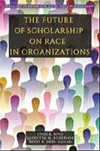
The Future of Scholarship on Race in Organizations
Edited by:
Eden B. King, Rice University
Quinetta M. Roberson, Michigan State University
Mikki R. Hebl, Rice University
A volume in the series: Research in Social Issues in Management. Editor(s): Eden B. King, Rice University. Quinetta M. Roberson, Michigan State University. Mikki R. Hebl, Rice University.
Published 2022
Since the term “workforce diversity” was first coined in the 1990s, the topic has received consistent and increasing attention by researchers. Over the last 30 years, a body of theory and research has amassed which recognizes diversity as an important work unit characteristic and explored its influence on organizational functioning and performance. Despite these advancements, the field is at a critical juncture where new ideas, emphases, theories, predictions and approaches are needed to propel our understanding of the meaning, import and functioning of diversity in organizations. Accordingly, this volume looks to the future of diversity work, both with regard to the content of the chapters and to the contributors. We endeavored to give a voice to emerging scholars who are the future of our field and can help to set a future research agenda to push our understanding of diversity in organizations. The scholars raise new and provocative questions about race in organizations that deliberate on the state of our science, our understanding of complex experiences of race, and a more nuanced view of race in terms of intersectionalities. Overall, each of these chapters provokes the status quo and, in so doing, offers a fresh perspective on the study of diversity in general and race and racism more specifically. We believe the end result is a more comprehensive exploration of the phenomenon and the development of an exciting future research agenda.
CONTENTS
Preface, Quinetta M. Roberson, Eden B. King, and Mikki R. Hebl. Examining the Racialized Consequences of Objectivity in Management Scholarship, Brittany Torrez, Cydney H. Dupree, and Michael W. Kraus. Broadening the Context: Addressing Systemic Oppression in Organizational Research, Catherine Warren, Ngoc S. Duong, Nicholas P. Salter, and Anmol Sachdeva. What Doesn’t Kill You, Makes You Stronger: Applying a Strength-Based Approach to Black Employees’ Workplace Experience, Richard V. Burgess and Kalan R. Norris. Let’s Talk About #BLM: The Role of Value Congruence on Supervisor-Subordinate Relationship, Lori Ramirez and Sarah Singletary Walker. Transforming Racial Microaggressions into Leader Identity Development Through Self-Narratives, Amber Kea-Edwards and Rebecca J. Reichard. The Impact of Mega-Threats and Political Ideology on Black Employees, Sydney N. Green, Gino J. Howard, Hannah Perkins Stark, Horatio D. Traylor, and Rachel Williamson Smith. Black Lives Matter: True Commitment or Tokenism? Emily Moore and Anju Philip. Just Getting Started: An Organizational and Management Scholar’s Perspective on the Challenges Faced by Black Female Founders, Shana M. Yearwood. The Authenticity Paradox: A Double Consciousness Perspective of Race, Gender, and Authenticity at Work for Black Women, Karoline M. Summerville and Enrica N. Ruggs. Double Jeopardy or Intersectional Invisibility? Reconciling (Seemingly) Opposing Perspectives, James T. Carter and Rebecca Ponce de Leon. Racial and Gender Diversity in Artificial Intelligence Programming and its Impact on End User Experiences: A Conceptual Model, MaQueba Massey and Quinetta M. Roberson. About the Authors.
-
Paperback978-1-64802-841-0
Web price: $45.04 (Reg. 52.99)
-
Hardcover978-1-64802-842-7
Web price: $80.74 (Reg. 94.99)
- eBook978-1-64802-843-4

- BUS097000 - BUSINESS & ECONOMICS: Workplace Culture
- BUS041000 - BUSINESS & ECONOMICS: Management
- BUS085000 - BUSINESS & ECONOMICS: Organizational Behavior
-
 Diversity, Equity, and Inclusion Insights in Practice
Diversity, Equity, and Inclusion Insights in Practice
-
 Emerging Perspectives on Organizational Justice and Ethics
Emerging Perspectives on Organizational Justice and Ethics
-
 Perspectives on Gender and Work
Perspectives on Gender and Work
-
 Perspectives on Race in Organizations
Perspectives on Race in Organizations
-
 Pushing our Understanding of Diversity in Organizations
Pushing our Understanding of Diversity in Organizations
-
 The Future of Scholarship on Diversity and Inclusion in Organizations
The Future of Scholarship on Diversity and Inclusion in Organizations
-
 The Social Dynamics of Organizational Justice
The Social Dynamics of Organizational Justice

